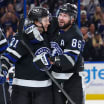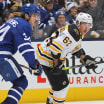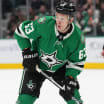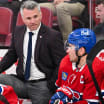The 2018 Hockey Hall of Fame induction is Monday. This class includes NHL Commissioner Gary Bettman, and Willie O'Ree, the first black player in the NHL, in the Builders category as well as former players Martin Brodeur, Martin St. Louis, Alexander Yakushev and Jayna Hefford. Here, NHL.com senior writer Dan Rosen profiles St. Louis.
St. Louis glad he took hard road to Hockey Hall of Fame
Forward motivated by doubters became prolific scorer, Stanley Cup champion
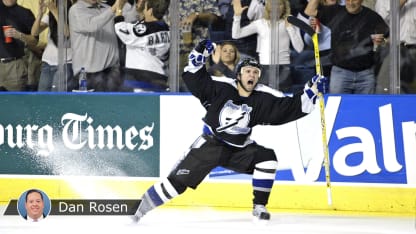
Martin St. Louis
wonders if his path to the NHL two decades ago would have been as long and bumpy if he were arriving today, when smaller players are all-stars, trophy winners and champions.
Probably not, he figures.
"Everything would have been easier for me," St. Louis said.
But would easier have been better for St. Louis (5-foot-8)? Would easier have resulted in the right wing having a Hall of Fame career?
"I don't know," St. Louis said. "Would I have had the chip on my shoulder?"
Probably not, which matters.
\[RELATED: St. Louis got to Hockey Hall of Fame on desire, attitude, Tortorella says\]
St. Louis took the hard road to the highest honor in the game. He will be inducted into the Hockey Hall of Fame on Monday, more than 20 years after he started carving out an NHL career, proving doubters wrong every step of the way.
St. Louis retired in 2015 with 1,033 points (391 goals, 642 assists) in 1,134 games. He won the Stanley Cup, an Olympic gold medal, the Hart Trophy, the Art Ross Trophy twice and the Lady Byng Trophy three times.
"I'd rather accomplish hard things than have everything be easy, because when you hit bumps you're not as ready for the challenges if you haven't been challenged," St. Louis said. "The bumps shaped me for the person and player I became."
It was hard to get an opportunity at the beginning. A strong four-year career at the University of Vermont didn't attract enough attention from the NHL. The undrafted St. Louis signed with Cleveland of the International Hockey League to get his start in pro hockey 1997.
The Laval, Quebec, native played well enough (50 points in 56 games) that the Calgary Flames gave him his first NHL contract in February 1998. St. Louis spent the next two seasons toggling between the American Hockey League and the Flames' fourth line.
"It was a hard start, but I didn't really know any other way," St. Louis said. "I had nothing easy, so to play at the highest level, I never thought it would be easier than anything else I got in my young career. But once I dug my feet in, it took off pretty rapidly."
The Flames picked up the one-year option on St. Louis' contract after the 1999-2000 season, but that was before new general manager Craig Button took over on June 6, 2000.
The Flames' scouting staff didn't believe St. Louis was a capable NHL player, so they left him exposed in the 2000 NHL Expansion Draft on June 23. He wasn't selected by either the Columbus Blue Jackets or Minnesota Wild, so the Flames bought out the remainder of his contract, making him an unrestricted free agent.
St. Louis signed a two-year contract with the Tampa Bay Lightning on July 31, 2000. He scored 40 points (18 goals, 22 assists) in 78 games in the 2000-01 season, showing he could be an everyday NHL player.
A broken leg derailed his 2001-02 season, but St. Louis had 70 points (33 goals, 37 assists) in 2002-03 and shot up to 94 (38 goals, 56 assists) in 2003-04, when he won the Art Ross Trophy, the Hart Trophy and helped lead the Lightning to the Stanley Cup.
Only seven other players in NHL history have won the Art Ross Trophy, the Hart Trophy and the Stanley Cup in the same season.
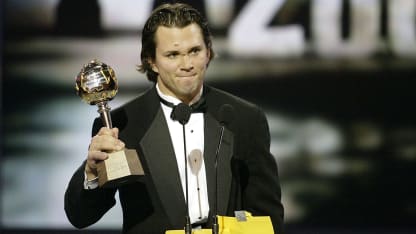
© Craig Melvin/Getty Images
The most important goal of his career came in the 2004 Cup Final, when he scored the double-overtime winner in Game 6, the goal that kept the Lightning alive and gave them a chance to win the series and the Stanley Cup against the Flames in Game 7.
"His work ethic, his heart -- I've played with a lot of good players, but Marty had the biggest of both," said former NHL defenseman Dan Boyle, who played with St. Louis in Tampa Bay and with the New York Rangers. "I have never seen a guy work harder or care more about the game than Marty. He had this never-say-die attitude. He never gave up on a puck, never gave up on a play. If I had to start a team with anybody I played with before, Marty is my first pick."
Former teammates all talk about St. Louis' insatiable desire to improve.
It was contagious.
"He was the guy that everyone followed," said Steven Stamkos, who took over as Tampa Bay's captain when St. Louis was traded to the Rangers on March 5, 2014. "If he was going to the gym after practice, you wanted to follow him and go in the gym. If he was going on the ice before practice to shoot a few pucks, you were following him on. He was just the ultimate professional and as a young guy it was so easy for me to just follow in his footsteps and realize the correlation between work ethic and success in the League. He was the standard for that."
Rangers forward Chris Kreider, who grew up in the Boston area with a St. Louis poster on his bedroom wall, vividly remembers St. Louis standing in the right circle before and after practicing waiting for someone to pass him the puck so he could work on his shot.
Kreider then recalled St. Louis' overtime winner from the right circle in
Game 4 of the 2014 Eastern Conference Final
that gave the Rangers a 3-1 series lead against the Montreal Canadiens. New York would win the series in six games.
"He wasn't here for a super long time, but I saw him do that a thousand times," Kreider said. "That wasn't by accident. He found his spot and he practiced that shot hundreds of thousands of times for moments like that."
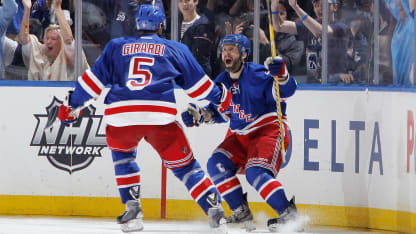
© Scott Levy/Getty Images
One round prior, St. Louis scored easily the most emotional goal of his career, doing so on Mother's Day,
May 11, 2014
, two days after his mom, France, died of a heart attack at the age of 63. It helped the Rangers even the Eastern Conference Second Round series against the Pittsburgh Penguins at 3-3.
St. Louis had an assist on Brad Richards' series-winning power-play goal in the second period of Game 7,
a 2-1 Rangers win
.
"He did have an unbelievable light side to him that kept everyone on their toes and laughing, but when it came to something that could be won, he was the ultimate competitor," Stamkos said.
Practice was never a chore for St. Louis because he viewed it as an opportunity to improve.
"Even in my best years, I never felt that I was the fastest skater, that I had the best hands, that I had the best shot," St. Louis said. "There's always guys who could do things better, but I felt I was good because I was good at getting better."
He always tinkered too, with his stick, skates, techniques.
"I wasn't the guy who would say, 'Oh, it'll just come back around,' " St. Louis said. "To maintain and play as long as I did and be successful as long as I was, to be able to be considered a Hall of Famer, I knew luck would have nothing to do with it. You have to work at it."
St. Louis' work ethic and attitude gave him the confidence to believe he could and should be the guy with the game on his stick whenever possible.
Stamkos said he and St. Louis used to joke about St. Louis' on-the-bench stare at the coach, his way of demanding to get back into the game.
"He always felt that he could be a game-breaker," Stamkos said. "There was really no off switch with Marty. It was always game on."

© Scott Audette/Getty Images
St. Louis' attitude was at times challenging for his coaches.
John Tortorella, who coached St. Louis in Tampa Bay from 2001-08, said he could be a pain because he'd always have questions and always demand answers. If St. Louis wasn't satisfied with the answer, he'd ask more questions.
Tortorella, now coach of the Columbus Blue Jackets, said on more than one occasion he'd have to tell St. Louis to stop bugging him. Not surprisingly, St. Louis rarely listened.
"He'd rub you the wrong way at certain times, but the ultimate goal was to win," Tortorella said. "I really appreciate that about him."
Along the way, St. Louis became a mentor.
Derek Stepan, the Arizona Coyotes center who played with St. Louis in New York, said he'll reach out to St. Louis for advice.
"Like last year, at the beginning of the year when we hadn't won a whole lot, I reached out and I was like, 'What do ya got for me? Help me out,' " Stepan said.
There was no one for St. Louis to reach out to when he was starting out. There was no road map to follow or mentors to lean on.
St. Louis had to do it on his own, the hard way.
"When you accomplish things that nobody expects you to accomplish, I think they feel twice as good when you do accomplish them," St. Louis said. "For me, that was what drove me. You think I can't. I'll show you. That's what made me as a player, I'll show you."









